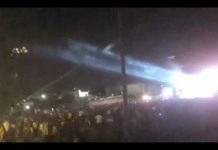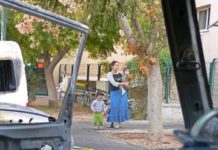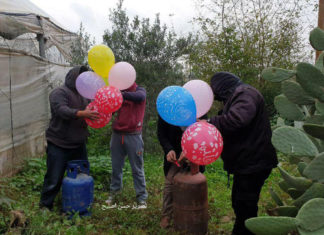Israeli National Police
spokesperson, Micky Rosenfeld
Israel’s Border Police tracked down and closed two offices in Jerusalem this week that were found to belong to the Hamas terrorist organization.
Both were located in the ancient City of David (Silwan) neighborhood.
One of the offices allegedly raised money for “charity.” The other ostensibly housed the activities of a “soccer team.”
The offices were closed for a minimum of 30 days.
“This is part of the Israeli policy to prevent any Hamas activity inside Jerusalem,” said Israel Police spokesman Mickey Rosenfeld. “Over the last year we’ve closed down altogether 10 buildings in connection with Hamas activities,” he noted.
He added the closures were viewed as part of routine Israeli law enforcement in the city of Jerusalem.
The Kingdom of Jordan is also continuing its policy not to allow Hamas officials to open offices in the Hashemite kingdom, despite a recent visit by Hamas political bureau chief Khaled Mashaal. The politburo chief was expected to arrive in Iran, the group’s generous patron, on his region-wide tour by Monday.











Here’s some excerpts from an iniervtew with Khalid Mishal from early 2008 (not available online).While he’s mostly talking about the consequences of participating in elections and the subsequent blockade of Gaza, it seems fair to assume they would apply to the most recent devastation.No. Despite all that has happened, we do not regret participating in the elections, nor in the government. Of course, we have assessed and evaluated the entire experience, and we do so in an honest and transparent way. The movements institutions examine where we succeeded and where we were in error. I am not going to claim that the experience has been all positive, but it also cannot be claimed to have been all negative, and at the end of the day we do not regret the experience.When you have assessed the political circumstances and chosen to respond to national requirements and the demands of your people, you don’t regret it even if you experince difficulties and pain as a result. You don’t regret jumping in to a river to save a drowning person Also the decision was the product of intensive discussion and study by the movement and its institutions, which took more than four months to conclude. It was a calculated decision taken by a clear majority within the movements institutions rather than an impulsive or individualistic decision.The circumstances in which we operate today are not the product of our participation in the elections. Our present circumstances result from the fact that we have an enemy that wants to eliminate us, that wants to organise the Palestinian arena according to its designs and will Despite all that has happened, Hamas remains a reality that neither the US administration nor its regional allies, nor its allies in the Palestinian arena, can get rid of. Some have suggested that Hamas did not expect an Israeli invasion, but this iniervtew shows that Hamas were considering the possibility at the beginning of last year.Q. Do you expect a full-scale invasion of Gaza?A. Not necessarily. The Gaza strip involves different calculations. Israel is confronted by two primary questions: the costs of such an invasion, and what to do after it. Israel may therefore opt for a gadual escalation, proceeding according to the achievements of each step. They are trying this now in the northern Gaza strip. They might seek to divide Gaza into three sectors, or engage in a prolonged war of attrition and perhaps then proceed with a general invasion.Q. Do you think that there is a resolution to the Israeli-Palestinian and Arab-Israeli conflicts?A. There is an opportunity to deal with this conflict in a manner different from the way Isreal and, behind it, the US are dealing with it today. There is an opportunity to achieve a Palestinian national concensus on a political program based on the 1967 borders, and this is an exceptional circumstance, in which most Palestinian forces, including Hamas, accept a state. This was specified in the National Conciliation Document. A state on, and not within, the 1967 borders. On the borders of June 4, 1967, including Jerusalem, the right of return, with full sovereignty, and without settlements If anyone thinks that the conflict can be ended, and that calm, stability and security can be achieved in the region at the expense of Palestinian rights, they are deluded.